Hollande's Europe: Integration and Solidarity
Adelina Marini, February 15, 2013
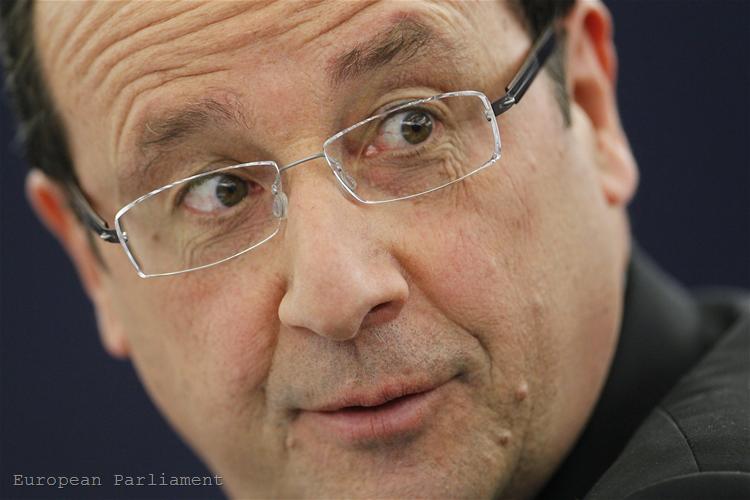 There is no doubt that France and Germany are the motor of the European Union and this is especially evident from the appearances of the leaders of the two countries on European stage. But you will be mistaken to think that it is about their participation in the Council of the EU or the EU summits where, in general, the national interests emerge stronger than the common European ones, although, especially in the vocabulary of Paris and Berlin, the two groups of interests are thickly intertwined. Their leading role was seen strongest in the European Parliament. With the reform of the economic governance of the EU and especially with the introduction of the European Semester for closer coordination of economic and budgetary policies a monetary and economic dialogue has been introduced with representatives of the member states.
There is no doubt that France and Germany are the motor of the European Union and this is especially evident from the appearances of the leaders of the two countries on European stage. But you will be mistaken to think that it is about their participation in the Council of the EU or the EU summits where, in general, the national interests emerge stronger than the common European ones, although, especially in the vocabulary of Paris and Berlin, the two groups of interests are thickly intertwined. Their leading role was seen strongest in the European Parliament. With the reform of the economic governance of the EU and especially with the introduction of the European Semester for closer coordination of economic and budgetary policies a monetary and economic dialogue has been introduced with representatives of the member states.
Nowhere is it said explicitly that the heads of state or government should appear too, but under the chairmanship of German Socialist Martin Schulz the debates in the Europarliament with leaders of the member states are turning into a tradition. Angela Merkel appeared for the first time in such a capacity in the autumn, in the peak of another series of the discussion about deeper European integration. And although she left no doubt that Germany and the EU are the two sides of one and the same coin, her vision about common Europe was rather linked to the efforts on national level - to do the reforms that will ensure equality and that there will be no countries lying on the back of others; to walk cautiously and carefully toward deepening of the European integration to avoid failures and to analyse thoroughly the mistakes so far; the construction of the EU to continue step by step, without a rush and emotions.
Quite the opposite is the vision of the French President, a Socialist, Francois Hollande, who also appeared before the MEPs in Strasbourg in a very appropriate time - just days before the second and final summit of the negotiations on the multiannual financial framework of the Union 2014-2020. The moment was indeed quite appropriate because the spotlights focused on France, exposing the overall vision of Mr Hollande about the future of Europe on the eve of such an important summit. So far, France's position (which is valid for all the other member states) reached all the corners of the EU partially and depending on the issue, making it difficult for one to imagine after all how does the Franco-German motor work, is there a conflict, is there a retreat from the plans for upgrade of the European construction, what is the overall vision about the future of Europe.
This is precisely why Martin Schulz's initiative to invite national leaders to speak from the European tribune about their visions for the future of the EU is very good and deserves admiration, although it hides risks, as I wrote recently on the occasion of the appearance of Austria's Chancellor Werner Faymann, who spoke in an almost empty house. On February 6th, however, the house in Strasbourg was full which is another proof of how important the role of France is at common European level.
Europe is a project of the future
According to Francois Hollande, currently Europe is at crossroads and is moving 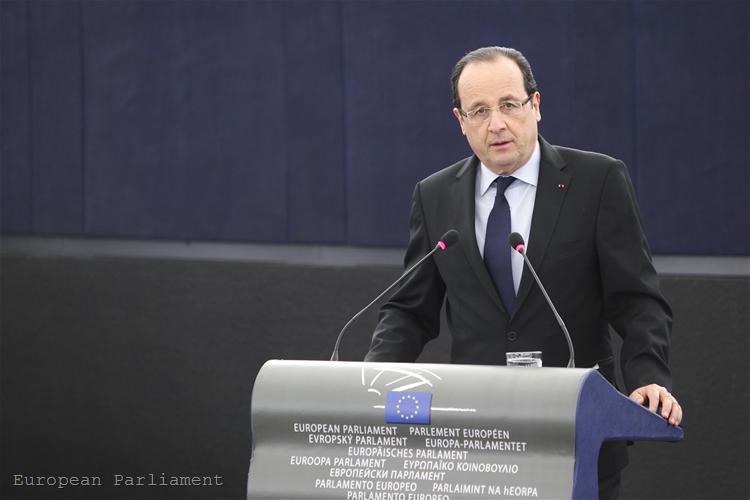 very hesitantly forward. At times it makes a step forward, but then it stops. It takes a lot of time before it makes important decisions and dedicates a little time on deliberations about its own future. And this is true because since the time of the Convent when the project of a European constitution was debated, discussions, even philosophical ones, about what kind of a Europe would we like to have in 10-15-20 years have not taken place. Just in a moment everyone got tired of too many discussions, the big ambitions were cut and so on December 1st 2009 Europe woke up with the Lisbon Treaty, highly unprepared for what was already burning under its feet - the eurozone crisis and in the rest of the EU. Since then, any steps toward more integration and the phrase that has become very popular - "more Europe" - are made under pressure by external factors, not because of an inherent need to continue upgrading.
very hesitantly forward. At times it makes a step forward, but then it stops. It takes a lot of time before it makes important decisions and dedicates a little time on deliberations about its own future. And this is true because since the time of the Convent when the project of a European constitution was debated, discussions, even philosophical ones, about what kind of a Europe would we like to have in 10-15-20 years have not taken place. Just in a moment everyone got tired of too many discussions, the big ambitions were cut and so on December 1st 2009 Europe woke up with the Lisbon Treaty, highly unprepared for what was already burning under its feet - the eurozone crisis and in the rest of the EU. Since then, any steps toward more integration and the phrase that has become very popular - "more Europe" - are made under pressure by external factors, not because of an inherent need to continue upgrading.
The French president believes that the crisis situation at the moment, the weak growth and high unemployment are not a temporary situation, but a significant change. If it is true, he said, that the crisis is already behind us, then we still haven not succeeded in learning the lessons from it. Without elaborating about what lessons have not been learnt, he explained that there is demoralisation - not of the markets, but of people - and it is the greatest danger the Union is facing. And another thing that often draws attention, but when said by a head of state has a different weight - too often national interests prevail over the European ones. Yes, many things have been done so far, Mr Hollande continued, but we should not stop here because 28 million Europeans are without a job. It is necessary, according to him, policies to be adapted to national specifics and to be implemented in a reasonable manner.
If implementing austerity policies continues for too long it will lead to severe consequences. According to him, the countries that have problems with competitiveness should get a sip of air "at least for a period of time". This remark seems to have been directly addressed to Germany because, according to Francois Hollande, the countries with high competitiveness should allow the rest to recover until a balance is reached. At the moment, France has significant difficulties that led to tensions on the 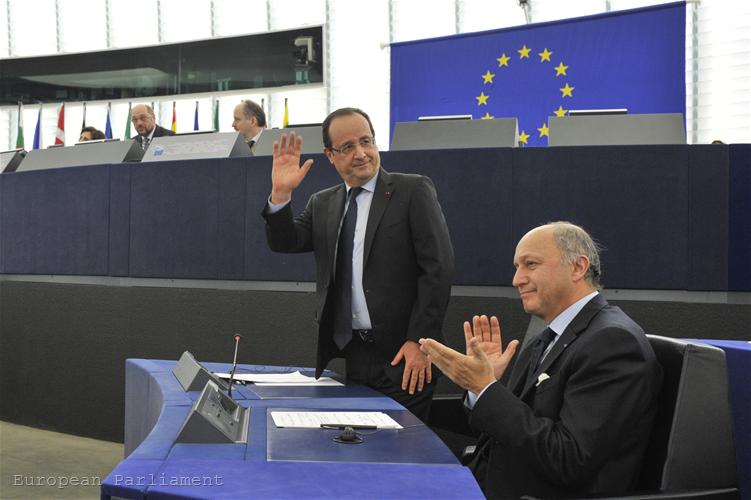 two sides of the Rhine because the growingly worrying data about declining competitiveness of the French economy cause serious concerns in Berlin.
two sides of the Rhine because the growingly worrying data about declining competitiveness of the French economy cause serious concerns in Berlin.
Hollande was not sufficiently circumstantial in his comments, but the guidelines in his speech make it clear that he defends some sort of bigger European centralisation. One of the problems he only marked during his speech in Strasbourg on February 6th proved part of much bigger efforts - the exchange rate of the single currency. The exchange rate of the euro cannot constantly hesitate because in this way it "eats" the achievements in terms of competitiveness. A zone of a single currency should be able to influence the exchange rates, he said. The issue about control of the exchange rate was raised by Pierre Moscovici, the French minister of finance, during the Eurogroup meeting on February 11th, but it was not met very warmly by the others, especially by Germany and the new chief of the Group, Jeroen Dijsselbloem. According to the eurozone ministers of finance, especially from the Nordic countries, the markets should define the exchange rates.
Without integration there cannot be solidarity
Francois Hollande said that two principles were in the foundation of the EU and they are integration and solidarity. Integration is to define common goals and harmonise policies. Common policies for infrastructure and research are needed, but integration depends entirely on the new financial instruments. Solidarity is not simply transferring resources among the member states, but a social ambition to ensure employment, training and education for every citizen. Solidarity is to tackle unemployment by using the globalisation adjustment fund. Quite in the spirit of socialist doctrine, Francois Hollande explained that security of workers must be guaranteed throughout their entire career and their pensions as well. A guarantee for minimum wage is also needed. He did not explicitly mention the word 'budget', but pointed out that new financial instruments are needed and one such instrument is the financial transactions tax.
As many times Francois Hollande mentioned the words 'integration' or 'solidarity', guarantees for the jobless and a combination of austerity measures plus boosting growth, that many times he got strong applause. He made several times courtesy to the European Parliament, defining it as a pioneer on the path toward deeper integration. He got applause also for his remark that Europe is not only a budget, a single market and a single currency, nor can it be viewed as a set of rules and treaties which regulate the 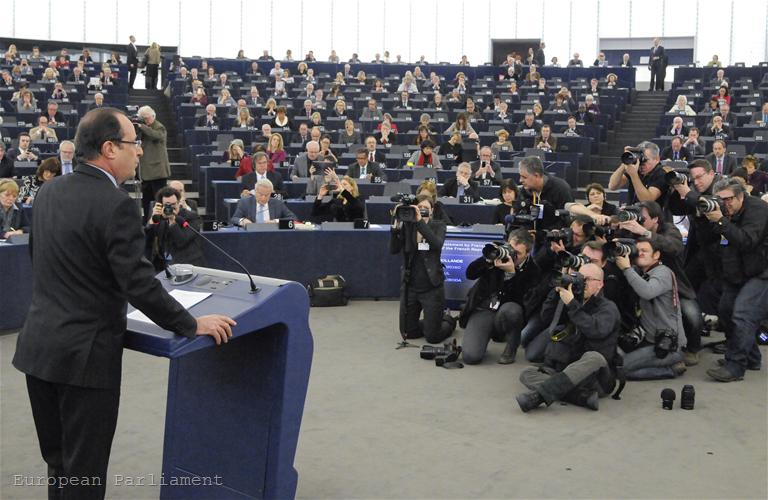 living together. Europe should be viewed as a union of nations, each of which has come in to search for a solution for its future. Europe is a political project, Mr Hollande concluded, a balance between rules and responsibilities.
living together. Europe should be viewed as a union of nations, each of which has come in to search for a solution for its future. Europe is a political project, Mr Hollande concluded, a balance between rules and responsibilities.
This year, he believes, the future of Europe is to be debated. France is against a Europe of two speeds, although this phrase came precisely from Paris. In the year 2000, the then French head of state Jacques Chirac called not somewhere else but from the tribune of the German parliament France and Germany to lead a group of pioneer countries toward faster integration. Then Mr Chirac (a gaullist) excluded the possibility of a super-state and underscored the dominating role of national sovereignty. He then used the phrase "a two-speed Europe" for the first time. 13 years later, Francois Hollande said that it cannot be worked with a Europe in which everyone is picking favourite meals from a menu, obviously addressing British Prime Minister David Cameron who in the end of January promised his fellow countrymen a referendum on UK's EU membership if, however, he is to be re-elected.
We should talk about bigger legitimacy of Europe, with institutions that can help influence the fate of the entire world. Hollande spoke about EU's common foreign policy, especially in the context of Mali, about how the EU should speak with a single voice on global stage. We can no longer wait on the US, said Hollande and pointed out that Europe should be present in the Middle East, to participate in the renewal of the talks between Israelis and Palestinians, to play its role in climate change and generally said - to be an example.
Hollande's speech was strongly applauded and was causing the smiles of the European Commission chief, Jose Manuel Barroso, who was listening very attentively to the French president's speech. Alas, the MEPs did not succeed in responding to the task, thus put, may be excluding the chief of the group of liberals in the Europarliament, Guy Verhofstadt, who is among the passionate supporters of Europe's federalisation. He recalled that the world no longer is a sum of 200 states, but a conglomerate of big and powerful federations. China is not a country, it is an entire civilisation. India is a 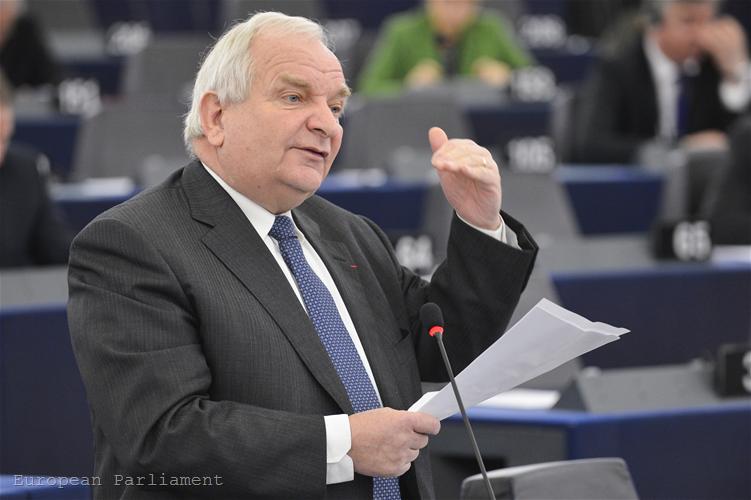 continent with thousands of ethnic communities and languages and the United States is a culturally diverse state. Europe should be an empire of good, the former Belgian prime minister said.
continent with thousands of ethnic communities and languages and the United States is a culturally diverse state. Europe should be an empire of good, the former Belgian prime minister said.
The leader of the biggest political group in the EP - EPP - Joseph Daul (France) warned the French president that he had to pick a side - either leaving David Cameron to unravel the EU bit by bit or to choose the European Parliament which wants to create a union that is capable to meet the challenges.
Daniel Cohn-Bendit (France), co-chairman of the group of Greens and the European Free Alliance, pointed out that there are problems in the relations between the Council and the European Parliament. He warned, however, that the world of the future 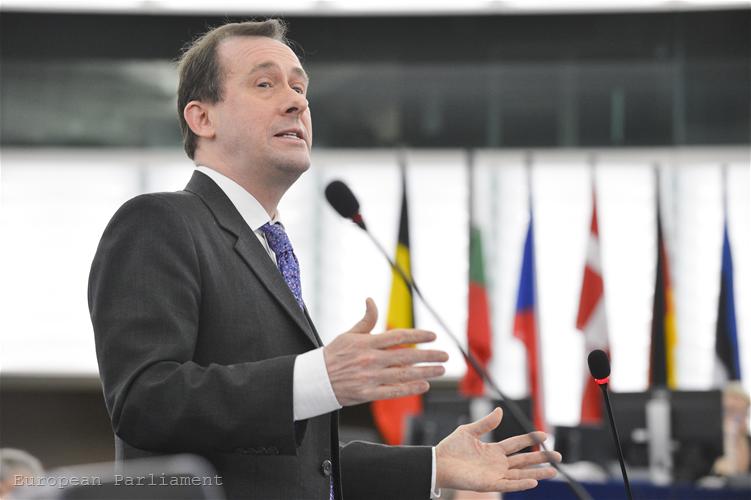 cannot be built with ideas from the past. Conservative Martin Callanan (Britain), from the group of European Conservatives and Reformists, attacked Francois Hollande politically saying that since he is in power it has become evident how disastrous socialists can be even for a well positioned country. According to Mr Callanan, the crisis has started with the socialists in Spain, Portugal and Greece. Philippe De Villiers from the group of Europe of Freedom and Democracy (France) also criticised Hollande, saying that the dream about integration of the European nations has vapourised entirely because it is bound with many lies. The lies about Schengen, about a union without customs borders and about a common currency. The result, however, is lack of security, crash of European industry and no growth at all.
cannot be built with ideas from the past. Conservative Martin Callanan (Britain), from the group of European Conservatives and Reformists, attacked Francois Hollande politically saying that since he is in power it has become evident how disastrous socialists can be even for a well positioned country. According to Mr Callanan, the crisis has started with the socialists in Spain, Portugal and Greece. Philippe De Villiers from the group of Europe of Freedom and Democracy (France) also criticised Hollande, saying that the dream about integration of the European nations has vapourised entirely because it is bound with many lies. The lies about Schengen, about a union without customs borders and about a common currency. The result, however, is lack of security, crash of European industry and no growth at all.
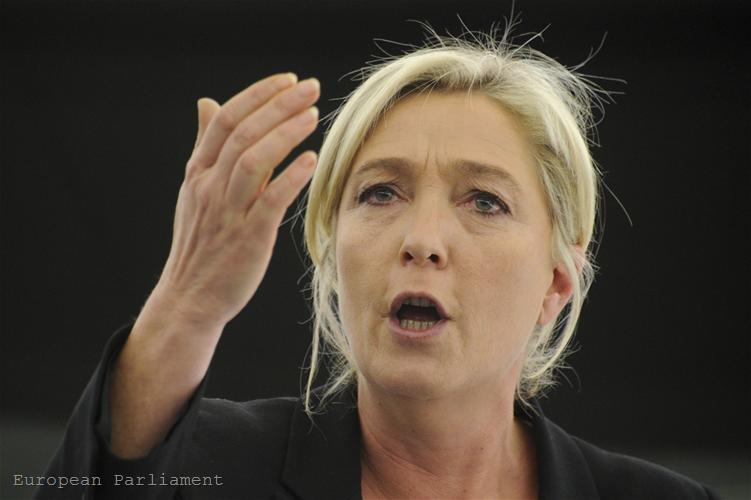 One of his biggest opponents during the presidential campaign last year, Marine Le Pen (non-attached), accused Hollande of leading toward a totalitarian Europe ruled by the ECB and aiming only for short-term policies. In the debate took part the British populist Nigel Farage as well, who reminded the French president that entrepreneurs were fleeing France because of high taxes. Europe is doomed not only in the Mediterranean, he warned, but it will be impossible in France and Germany too. According to him, the two countries will not remain in one and the same economic and monetary union.
One of his biggest opponents during the presidential campaign last year, Marine Le Pen (non-attached), accused Hollande of leading toward a totalitarian Europe ruled by the ECB and aiming only for short-term policies. In the debate took part the British populist Nigel Farage as well, who reminded the French president that entrepreneurs were fleeing France because of high taxes. Europe is doomed not only in the Mediterranean, he warned, but it will be impossible in France and Germany too. According to him, the two countries will not remain in one and the same economic and monetary union.
Will the sceptics prove right depends a lot on how will the debate on Europe's future begin and will it ever take place the way Francois Hollande described. In fact, if we look deeper into the statements of Merkel and Hollande before the MEPs we will see that there are no fundamental disagreements between them. They are simply addressing different stages. Ms Merkel insists the foundation of the future integration to be solid which means economically converged member states that coordinate their policies, stick to their commitments and bear the responsibility for their decisions which have 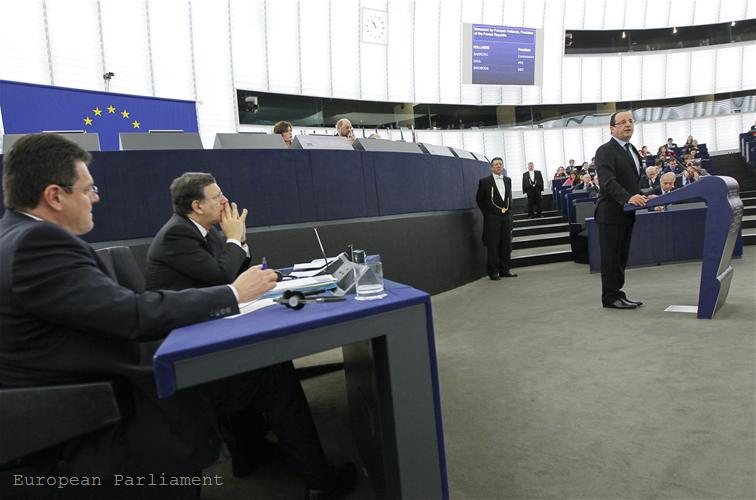 long ago ceased to have only national consequences. While Mr Hollande is talking about the future. A future which is backed by the Europarliament and the European Commission.
long ago ceased to have only national consequences. While Mr Hollande is talking about the future. A future which is backed by the Europarliament and the European Commission.
It will really be great if the European Parliament succeeds in organising the hearing of more heads of state or government throughout the year focusing, however, indeed on their visions about the future and avoiding narrow political issues and various directions. This will help us all assemble the jigsaw puzzle of national positions which will probably be a good starting point for talks about the future - a common Europe, a Europe of several speeds or some third way?
 Federica Mogherini | © Council of the EU
Federica Mogherini | © Council of the EU | © Council of the EU
| © Council of the EU Luis De Guindos | © Council of the EU
Luis De Guindos | © Council of the EU